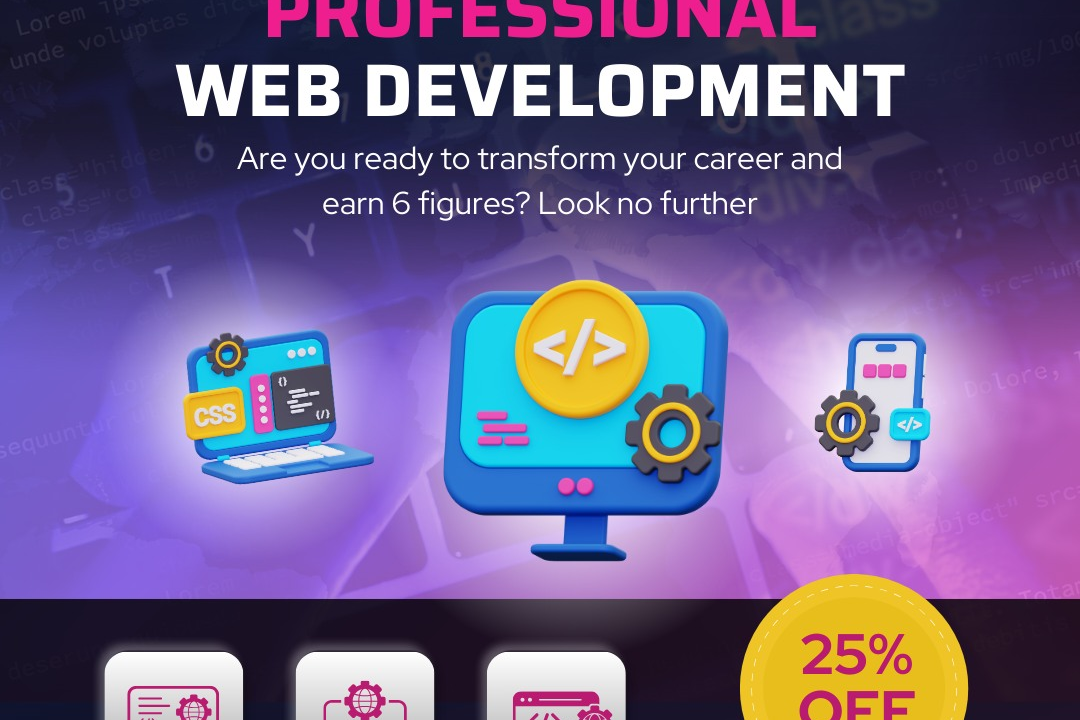selenium training institutes in hyderabad Gachibowli
Selenium training institutes in Gachibowli, Hyderabad, are specialized educational centers focused o
selenium training institutes in hyderabad Gachibowli
Selenium training institutes in Gachibowli, Hyderabad, are valuable resources for individuals looking to excel in the field of software testing and automation. With the growing demand for skilled testers in the tech industry, these institutes provide comprehensive training that equips participants with essential knowledge and hands-on experience in using Selenium for test automation. Courses often include real-time projects that allow students to apply what they've learned in practical scenarios, enhancing their employability and skill set. Additionally, the proximity to a major tech hub like Gachibowli makes these institutes accessible to professionals seeking to upgrade their skills in a competitive job market.
To Download Our Brochure: https://www.justacademy.co/download-brochure-for-free
Message us for more information: +91 9987184296
Selenium training institutes in Gachibowli, Hyderabad, are valuable resources for individuals looking to excel in the field of software testing and automation. With the growing demand for skilled testers in the tech industry, these institutes provide comprehensive training that equips participants with essential knowledge and hands on experience in using Selenium for test automation. Courses often include real time projects that allow students to apply what they've learned in practical scenarios, enhancing their employability and skill set. Additionally, the proximity to a major tech hub like Gachibowli makes these institutes accessible to professionals seeking to upgrade their skills in a competitive job market.
Course Overview
The Selenium training course offered by JustAcademy in Gachibowli, Hyderabad, is designed to provide participants with a comprehensive understanding of Selenium for test automation. The course covers essential topics such as Selenium WebDriver, TestNG, and integration with tools like Maven and Jenkins. With a focus on practical learning, students engage in real-time projects that simulate industry scenarios, enabling them to gain hands-on experience in developing and executing automated tests. This course is ideal for software testers, developers, and anyone looking to enhance their automation skills in a rapidly evolving tech landscape. Participants will also receive certification upon completion, validating their expertise in Selenium and boosting their career prospects in the software testing domain.
Course Description
JustAcademy offers a specialized Selenium training course in Gachibowli, Hyderabad, aimed at equipping students with the skills needed for effective test automation. This course delves into the fundamentals of Selenium WebDriver, allowing participants to understand its core components and functionalities. Through hands-on projects and real-time applications, students will learn how to create, manage, and execute automated test scripts efficiently, ensuring robust software applications. Additionally, the program covers TestNG for test management and introduces integration techniques with tools like Maven and Jenkins, enhancing the overall automation framework. Ideal for aspiring software testers and developers, this course culminates in a certification that demonstrates proficiency in Selenium, enriching career opportunities in the software testing field.
Key Features
1 - Comprehensive Tool Coverage: Provides hands-on training with a range of industry-standard testing tools, including Selenium, JIRA, LoadRunner, and TestRail.
2) Practical Exercises: Features real-world exercises and case studies to apply tools in various testing scenarios.
3) Interactive Learning: Includes interactive sessions with industry experts for personalized feedback and guidance.
4) Detailed Tutorials: Offers extensive tutorials and documentation on tool functionalities and best practices.
5) Advanced Techniques: Covers both fundamental and advanced techniques for using testing tools effectively.
6) Data Visualization: Integrates tools for visualizing test metrics and results, enhancing data interpretation and decision-making.
7) Tool Integration: Teaches how to integrate testing tools into the software development lifecycle for streamlined workflows.
8) Project-Based Learning: Focuses on project-based learning to build practical skills and create a portfolio of completed tasks.
9) Career Support: Provides resources and support for applying learned skills to real-world job scenarios, including resume building and interview preparation.
10) Up-to-Date Content: Ensures that course materials reflect the latest industry standards and tool updates.
Benefits of taking our course
Functional Tools
1 - Selenium WebDriver: Selenium WebDriver is the core component of the Selenium suite, allowing testers to automate web applications across various browsers. In the training program, students learn to interact programmatically with UI elements, handling complex user interactions, such as clicks, text input, and navigation across web pages. The program covers various WebDriver features, including implicit and explicit waits, which are essential for enhancing test reliability by managing synchronization issues. Students gain practical experience in writing robust and maintainable test scripts using WebDriver’s comprehensive API, enabling effective automation of web based applications.
2) Selenium IDE: Selenium Integrated Development Environment (IDE) is a browser extension that provides an intuitive interface for creating and running tests without the need for programming. The training program includes sessions dedicated to using Selenium IDE for recording and playback of test scenarios, allowing beginners to ease into automation testing concepts without extensive coding knowledge. It allows for quick prototyping of tests and helps students understand the basic elements of test creation, including assertions and configuration options. Emphasizing the importance of simplicity in automating repetitive tasks, students explore how to convert recorded tests into code for further customization.
3) TestNG: TestNG is a powerful testing framework inspired by JUnit and NUnit that is widely used in automation testing with Selenium. In our training course, students learn to utilize TestNG for creating test suites, managing test execution flows, and generating reports. With features such as annotations, grouping, and data driven testing, TestNG enhances the organization and scalability of test scripts. Students engage in hands on projects that involve integrating TestNG with Selenium to execute tests in parallel, thus improving testing efficiency. This framework supports advanced test configuration, including dependency management and prioritization of test cases, which are crucial for developing comprehensive testing strategies.
4) Maven: Maven is a build automation tool that streamlines the management of project dependencies, making it easier for developers to maintain and organize their Selenium projects. Within the training framework, participants learn to use Maven for managing Java libraries, setting up project structures, and automating build processes. Students are guided through creating a Maven project tailored for Selenium testing, allowing them to understand the concept of pom.xml files and dependency management. The integration of Maven with Selenium is explored, providing students with knowledge on how to build, test, and deploy applications efficiently, while ensuring their automated tests have access to the necessary libraries and resources.
5) JUnit: JUnit is a popular framework used for unit testing in Java, and its integration with Selenium provides an effective way to execute and manage test cases. In the training program, students delve into JUnit's features like assertions and test suites to create structured tests. Through practical exercises, learners develop skills to write effective unit and functional tests that can be run automatically, thereby facilitating continuous integration practices. The curriculum emphasizes using JUnit alongside Selenium to validate test outcomes, allowing learners to gain familiarity with automated testing concepts, test case organization, and execution strategy familiarization within software development life cycles.
6) Cucumber: Cucumber is a tool that supports Behavior Driven Development (BDD) and is used for writing automated acceptance tests in a human readable format. The training course introduces students to Cucumber’s Gherkin language, allowing them to define application behavior in simple, understandable terms. Participants work on creating feature files, step definitions, and integrating Cucumber with Selenium for seamless automation of acceptance tests. This approach helps bridge the gap between technical and non technical stakeholders, making collaboration easier during the development process. By including Cucumber in the curriculum, students learn to craft tests that not only validate functionality but also enhance communication with business partners regarding project requirements.
7) Page Object Model (POM): Page Object Model is a widely adopted design pattern that enhances test maintenance and reduces code duplication in Selenium test automation. During the training program, students learn how to implement POM by creating separate classes for each web page of the application they are testing. This approach streamlines test code, making it easier to manage and update tests as the application evolves. Students engage in practical exercises that emphasize creating methods for different actions on web pages, improving the readability and reusability of test scripts. By utilizing the Page Object Model, learners develop skills that ensure their test automation framework is scalable and easy to maintain.
8) Continuous Integration/Continuous Deployment (CI/CD): Understanding the principles of CI/CD is crucial for modern software development and testing. In the training curriculum, students are introduced to the concept of integrating automated tests into CI/CD pipelines using tools such as Jenkins and GitLab CI. This aspect of the course covers how to configure and trigger automated Selenium tests during the build process, enabling faster feedback cycles and ensuring software quality. By learning to implement CI/CD practices, students gain insight into the importance of automation in delivering features quickly and reliably, positioning themselves as valuable assets in Agile development environments.
9) API Testing with Postman: Modern applications often rely on APIs for functionality, making API testing an essential skill for testers. The training includes a section dedicated to API testing using Postman, allowing students to understand how to send requests, validate responses, and automate API tests. By integrating Postman with Selenium test suites, learners explore full stack testing strategies, ensuring that not only UI aspects of an application are validated, but also the underlying services that support them. Through hands on projects, participants achieve competence in designing automated API tests and integrating them within their overall testing framework.
10) Cross browser Testing: Cross browser testing is crucial for ensuring that web applications work correctly across different browsers and devices. Within the training course, students learn the importance of cross browser compatibility and how to leverage Selenium Grid for distributed test execution across various environments. Participants gain practical experience in configuring and running tests on multiple browsers simultaneously, identifying and addressing cross browser issues promptly. This knowledge ensures that graduates can deliver reliable and consistent user experiences regardless of the browser or device used by end users.
11 - Headless Browsers: The training program introduces the concept of headless browsing, which allows Selenium tests to run without a graphical user interface. Students learn to use headless browsers like Headless Chrome and PhantomJS to execute tests more rapidly, especially in CI/CD settings. This capability enhances testing efficiency, as users can run tests in the background while consuming fewer resources. By implementing headless browsers, learners discover how to integrate these tools into their testing strategies to improve speed without sacrificing test effectiveness.
12) Error Handling and Element Locators: Effective error handling and element identification are critical skills for automation testers. In the training program, participants dive into various strategies for locating web elements, utilizing techniques such as XPath, CSS selectors, and ID attributes. Students learn to implement robust error handling mechanisms, including try/catch blocks and custom error messages, ensuring their test scripts can recover from unexpected situations gracefully. By mastering these skills, learners enhance the resilience of their automated tests, leading to fewer failures and increased confidence in the testing process.
13) Performance Testing Integration: Although primarily focused on functional testing, it is beneficial for automation testers to understand performance considerations. The training program includes an introduction to integrating performance testing tools such as JMeter with Selenium. This module teaches students how to simulate user load while running automated functional tests, enabling them to assess both application performance and behavior under stress. By exploring this integration, participants gain insights into ensuring that applications not only function correctly but also meet performance expectations, thus rounding out their testing skill set.
14) Reporting and Dashboarding: Generating insightful reports is vital for communicating testing results to stakeholders. The training covers tools and frameworks for enhanced reporting, such as ExtentReports, Allure, or built in TestNG reporting features. Students learn to create meaningful visualizations and summaries of their test execution results, making it easier for teams to understand the quality and health of the application under test. By focusing on effective reporting practices, learners develop the ability to provide actionable insights and recommendations based on test outcomes, thereby increasing the impact of their testing efforts.
15) Real time Project Experience: A core component of the JustAcademy training program is the inclusion of real time projects. Students have the opportunity to apply their knowledge to real world scenarios, developing a comprehensive automation testing framework from scratch. This hands on experience allows them to face common challenges encountered in professional environments, such as handling dynamic content, dealing with authentication, and optimizing test execution times. Graduates emerge from the course with a portfolio showcasing their work, significantly enhancing their employability and readiness for roles in automation testing.
Browse our course links : https://www.justacademy.co/all-courses
To Join our FREE DEMO Session:
This information is sourced from JustAcademy
Contact Info:
Roshan Chaturvedi
Message us on Whatsapp: +91 9987184296
Email id: info@justacademy.co












